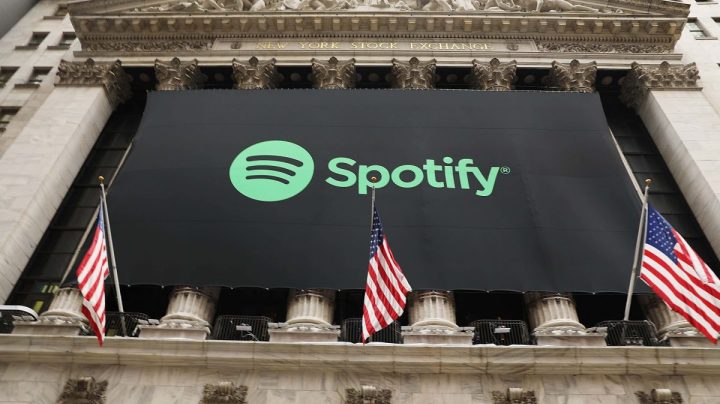Music Executive Claims Explicit Latin Trap Songs Are Denied Spotify Playlist Support

The Spotify banner hangs from the New York Stock Exchange (NYSE) on the morning that the music streaming service begins trading shares. Photo by Spencer Platt/Getty Images
Between 20 and 30 percent of Spotify plays come from its playlists, so it’s easy to understand why the music industry was abuzz over the company’s decision to remove R. Kelly and XXXTentacion from its curated content on Thursday. The streaming platform announced a new “hate content and hateful conduct policy,” which states that the company will not promote music they consider to be in conflict with their values in its editorial or algorithmic playlists, such as Discover Weekly or RapCaviar.
In the aftermath of the decision, Billboard reported on the industry’s reaction to the news, and one unidentified music executive told the publication that the guidelines have been an unofficial policy in Spotify’s Latin American and U.S. Latin divisions for a long time.
“For us, there is an understanding that this policy is in place,” said the anonymous Latin music executive. “Perhaps it wasn’t company-wide, but it was within certain editorial groups. Many Latin trap songs that are more explicit, for example, don’t get the support.”
The executive’s comments appear to conflate two different issues. One surrounds music with content that has been deemed offensive, and pertains to a war that has been raging since even before the mid-80s, when Tipper Gore and her group Music Resource Center started pressuring the industry to limit minors contact with releases deemed offensive. The concerns over R. Kelly and XXXTentacion, in contrast, have little to do with the artists’ music and more to do with their sexual abuse accusations. Both have been dealing with charges of witness tampering (XXXTentacion) and child pornography (which R. Kelly was acquitted of following a lengthy trial in 2008.)
The executive quoted by Billboard was clearly responding to concerns over the first category. Although they applauded the company’s “strong position” vis-à-vis violence against women, they were worried that the limitations already imposed by Spotify on explicit content may result in warping the content that artists create.
“What are you going to do if an artist likes to write about violent things?” they said. “It’s like the [R]enaissance…where artists got commissioned to paint very specific paintings, and others were condemned for painting what they wanted. In the end, an artist may think twice about what they produce because they’ll be positioned in a certain way on a playlist.”
When contacted for comment by Remezcla, a representative for Spotify’s Latin American and U.S. Latin team provided the following statement, which addresses issues of both offensive content and artists who are associated with unacceptable behavior in their personal life:
“We don’t censor content because of an artist’s or creator’s behavior, but we want our editorial decisions — what we choose to program — to reflect our values. When an artist or creator does something that is especially harmful or hateful, it may affect the ways we work with or support that artist or creator…The policy is rolling out and we will take it in a case by case basis.”
Only time will tell if Spotify will disclose specific Latino artists that fall under this policy. Remezcla will update this post if more information becomes available.